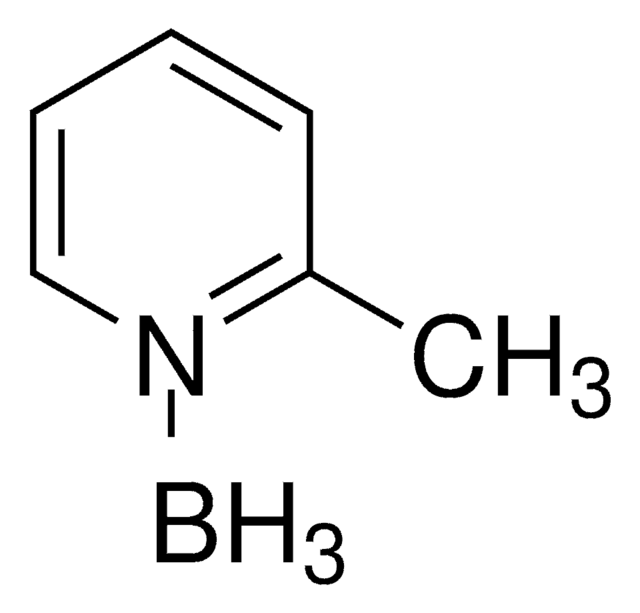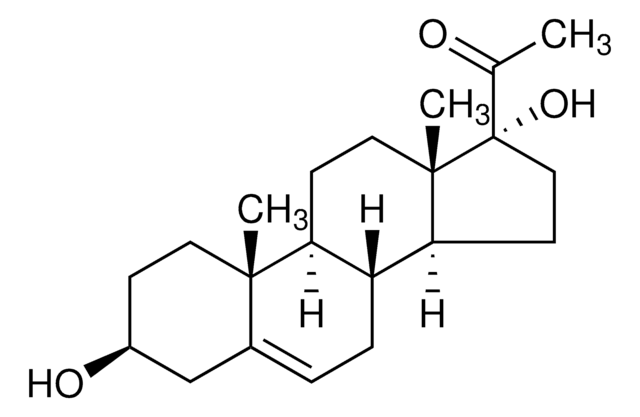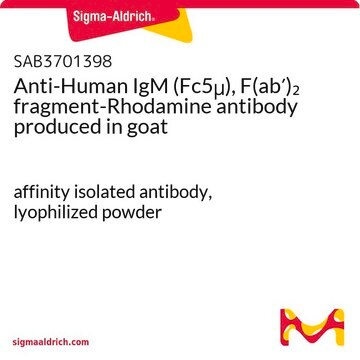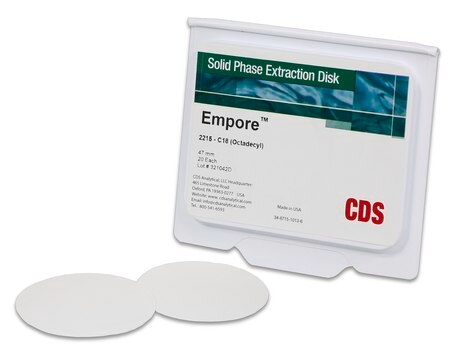C4187
Cyanoborohydride Coupling Buffer
Sinonimo/i:
Coupling buffer
Autenticatiper visualizzare i prezzi riservati alla tua organizzazione & contrattuali
About This Item
Codice UNSPSC:
12161700
NACRES:
NA.56
Prodotti consigliati
Forma fisica
liquid
Livello qualitativo
Impiego in reazioni chimiche
reagent type: reductant
tecniche
affinity chromatography: suitable
applicazioni
life science and biopharma
Temperatura di conservazione
2-8°C
Applicazioni
A ready-to-use reagent used to couple amine ligands to aldehyde functional groups. The coupling buffer reaction is a reductive amination of the intermediate Schiff′s base to a stable C−N bond.
Cyanoborohydride Coupling Buffer has been used:
- in coupling reactions between amines and glutaraldehyde
- to reduce hydrazone bond to a stable hydrazide bond
- as a component in oligonucleotide reaction mixture for coverslips functionalization
Cyanoborohydride Coupling Buffer is used in affinity chromatography, protein chromatography, activated/functionalized matrices and synthetic reagents. Cyanoborohydride has been used to inform a safe and effective gene-transfer system targeting hepatocytes as well as to develop a method for targeted delivery of anticancer therapeutics to cancer cells in hypoxic areas.
Azioni biochim/fisiol
Cyanoborohydride Coupling Buffer is a reagent suitable for reductive amination processes, that contributes to transformation of simple alcohols into more complex amines. It is used in the conversion of Schiff base, by reducing it, to form a secondary amine without affecting aldehyde groups on the support.
Componenti
0.02 M sodium phosphate, pH 7.5, containing 0.2 M sodium chloride and 3.0 g/L sodium cyanoborohydride
Avvertenze
Warning
Indicazioni di pericolo
Consigli di prudenza
Classi di pericolo
Acute Tox. 4 Oral - Aquatic Chronic 2
Codice della classe di stoccaggio
12 - Non Combustible Liquids
Classe di pericolosità dell'acqua (WGK)
WGK 3
Punto d’infiammabilità (°F)
Not applicable
Punto d’infiammabilità (°C)
Not applicable
Certificati d'analisi (COA)
Cerca il Certificati d'analisi (COA) digitando il numero di lotto/batch corrispondente. I numeri di lotto o di batch sono stampati sull'etichetta dei prodotti dopo la parola ‘Lotto’ o ‘Batch’.
Possiedi già questo prodotto?
I documenti relativi ai prodotti acquistati recentemente sono disponibili nell’Archivio dei documenti.
Use of polymer supported reagents for clean multi-step organic synthesis: preparation of amines and amine derivatives from alcohols for use in compound library generation
Ley S, et al.
Journal of the Chemical Society. Perkin Transactions 1, 15(27), 2239-2242 (1998)
Christopher A Holden et al.
International journal of nanomedicine, 5, 25-36 (2010-02-18)
Tumors frequently contain hypoxic regions that result from a shortage of oxygen due to poorly organized tumor vasculature. Cancer cells in these areas are resistant to radiation- and chemotherapy, limiting the treatment efficacy. Macrophages have inherent hypoxia-targeting ability and hold
Direct electrical detection of antigen?antibody binding on diamond and silicon substrates using electrical impedance spectroscopy.
Yang W, et al.
Analyst, 132(4), 296-306 (2007)
Binding between the integrin ?X?2 (CD11c/CD18) and heparin.
Vorup-Jensen T, et al.
Test, 282(42), 30869-30877 (2007)
Polymer-supported triacetoxyborohydride: a novel reagent of choice for reductive amination
Bhattacharyya S, et al.
Tetrahedron Letters, 44(27), 4957-4960 (2003)
Il team dei nostri ricercatori vanta grande esperienza in tutte le aree della ricerca quali Life Science, scienza dei materiali, sintesi chimica, cromatografia, discipline analitiche, ecc..
Contatta l'Assistenza Tecnica.









